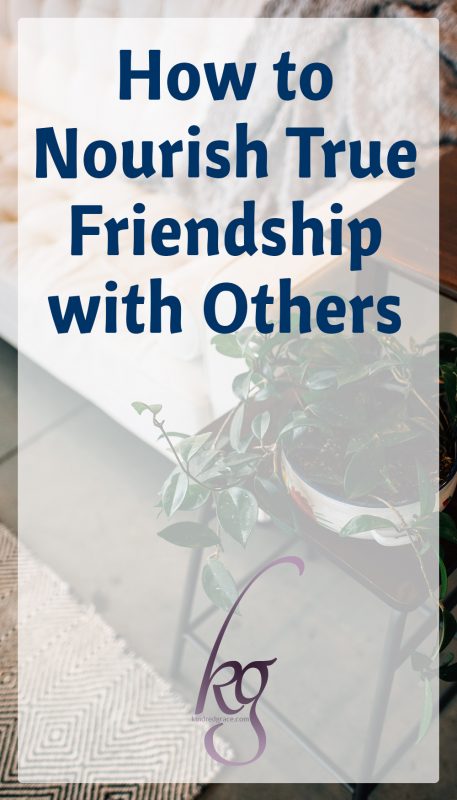How to Nourish True Friendship with Others
I stare at her text.
“I felt like you were dismissive and controlling. . .”
It’s like the phone burns my hand. I put it down and gaze out the window, willing myself not to cry, trying to gather my thoughts.
In following one friend’s advice, I inadvertently offended two others. And quickly clouding my sense of how I should respond and what to do next, shame swirls in.
I’m no good at this friendship thing. I don’t know how to do this. I am a terrible friend.
Run. Hide. Quit.
Though I’m confident keeping a home, doing a job, even teaching a classroom, being a friend is not a skill that comes easily to me. I’m much better at projects than at people.
But I know as human beings, we are created to love and be loved.
We are made in the image of God, meant to relate not just vertically but also horizontally.
It’s ultimately sin that fractures our friendships and causes the confusion, the isolation, the loneliness.
Friendship is a redeeming work of Jesus. And through my clouds of shame, I felt His truth filter through.
You are a good friend because I am making you a good friend. I declare you righteous and give you abundant grace. I supply the courage and wisdom you need to respond to this. The point where you feel like quitting is where you need to stick it out, because this is where the best friendship happens.
How do we, with our messy pasts and in our messy worlds, cultivate true friendships with others?
Here is what I’m learning, slowly, through trial and error, along the way:
1. Show Up
When I moved to this area six year ago, brand new and not knowing a soul in our big unfamiliar church, I wanted to hide in the closet and wait for people to come to me. Instead I learned to show up. Keep attending that church. Join a small group. Join a women’s Bible study.
I distinctly remember parking in a suburban neighborhood and sitting in my car taking several deep breaths, knowing I was about to walk into a women’s Bible study where I didn’t know anyone. It was like my comfort zone had shattered. I made myself walk in, and now six years later, I remember that beginning and I treasure the friends I made there.
I’m not new here anymore, but to be a friend I need to keep showing up, even when I don’t feel like it. When someone crosses my mind, I send a text: “thinking about you, praying for you, miss you, how are you doing?”
And though technology can help us connect, it’s not enough to be virtual friends. I need to show up physically, too. When it’s a cold winter night and I’m tired and it’s time for Bible study or small group and I would really rather stay home and veg—I go and find that I’m glad I went.
I try not to wait for an invitation, but instead actively reach out to others. I have three small children, a busy schedule, and some health issues, so hospitality has to be easy or it will never happen. When the weather is warm, we invite friends over and roast hot dogs and marshmallows over our firepit. When it’s cold, we invite friends over for crockpot chili. Hospitality is going to look different for each of us in our stages of life, but the important thing is an open heart.
There’s no magic formula for having friends. It’s making a decision to show up in other people’s lives, and to invite them into my own.
2. Accept Whom God Sends
I had an Anne-and-Diana complex where I keep waiting for a bosom friend to appear, and she never did. Instead, God sent me several imperfect women, and I clicked imperfectly with them. But they are my friends, my people, because they are the ones God sent me.
Sometimes I meet someone, and it feels like we have everything in common and ought to become best of friends, and it goes nowhere. Sometimes I meet someone, and we’re so different and I don’t really see it coming, but we end up forging a good friendship.
Friendship isn’t about describing my “ideal candidate” and waiting for that person to come along. It’s saying yes and showing love to the people God puts in my life.
3. Be Real
I’m not as confident as I would like to be. I’m not the life of the party, I don’t have an amazing sense of humor, I struggle with being assertive, and I usually don’t know what to wear.
Sometimes in a situation with other women, I look around and try to get my cues from those around me. Who looks like they know what they’re doing, and how can I be like them?
This never goes well, because the truth is, God didn’t make me to be like them. He made me to be me. Copying the people around me and trying to blend into them erases me and the gifts I do have. They don’t need another one of them.
God is bringing me to this group so that my unique personality and background and gifts can complement what’s already there.
I’m not the life of the party, but I’ll have a great one-on-one conversation with you on the side. I don’t have an amazing sense of humor, but I’ll laugh at your jokes. I struggle with being assertive, but I’ll notice and reach out to that person on the edge. I don’t know what to wear, but I’ll admit to you that my outfit doesn’t really work and I’ll ask you to go shopping with me.
4. Share Vulnerably
The best friendships I have are not with those who are the most perfect, but with those who are the most vulnerable. And each friendship only goes as deep as I do. This doesn’t mean we’re all TMI, or that we share sensitive information about other people. But it does mean that we’re open and honest about what’s going on in our hearts and lives, even if it doesn’t look pretty.
Being vulnerable is always a hard choice because it literally means being able to be hurt. I’m putting myself out there in such a way that I could be ridiculed, rejected, criticized, misunderstood, dismissed: it could end badly. But being vulnerable is believing that even if it does end badly, it was worth the try, and now I know who these people are and I’ll find real friends somewhere else. If it ends well, which is thankfully most of my experience, vulnerability paves the way for a depth of friendship that is rich with blessing.
I think people generally respond well to authenticity. When I share vulnerably, they honor that, and they become open, too.
We get past the “How are you? Fine? Fine!” conversations and into the good stuff.
5. Confess and Forgive Freely
Because we’re befriending in a fallen world, there’s going to be drama. There is going to be misunderstanding and hurt and disappointment. When I get to that bump in the road, my first instinct is to quit and run. That would make all my friendships anywhere from two days, two weeks, two months, to two years long—impermanent, floating from one friendship to another, one group to another, one church to another, because maybe the next one will be better.
Yes, sometimes a friend cuts us off and to honor their boundaries, we can’t be friends anymore. And sometimes someone makes continual unhealthy choices and we have to be the one to erect boundaries and not be friends anymore.
But I think those cases are really the exception to the rule.
The norm should be that when I’m sinned against, I either forgive it quietly, or talk to my friend about it if I need to and forgive it with them.
And when I’m the offender, I need to be confident enough that I’m justified freely by His grace—declared righteous by a God who loves me at my worst—that I don’t need to justify and defend myself; I can confess my sin and make it right.
So I text my friend back that I’m so sorry I was dismissive and controlling. I show up the next time we get together. And even though it’s not perfect and I’m feeling a little bit raw, it’s okay because Jesus is in this. These are my people.
He is making me into a good friend—me, with my oddities and nuances and quirks; with them, not the friends I would have necessarily anticipated, but the women God has called me to love.
Photography: JenniMarie Photography




What a beautiful, beautiful reminder. So convicting, too, when vulnerability is not my forte. Thank you for being an example in this to me.
Lisa, I relate so much to this. Thank you for being honest here in the imperfection.
Especially love this line: “I’m not as confident as I would like to be. I’m not the life of the party, I don’t have an amazing sense of humor, I struggle with being assertive, and I usually don’t know what to wear.”
Glad to have you on KG this week!